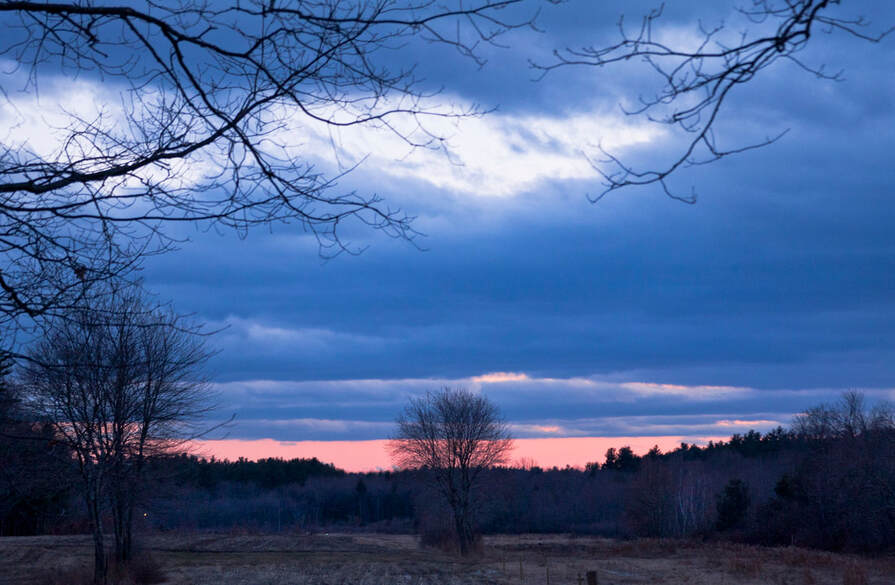|
Liz West CC Games for Heartland Girls, 1984 That summer we sing-sung their names to our reflections like whistling for the devil: Jenna Marx, Lissa Fitzpatrick, Ashlee Townsend. Three yellow-haired girls by end of June and our mothers locked our bikes away. Desperate for air, we lifted our shirts in front of dripping window coolers. In our fantasies, we were they—Jenna-Lissa-Ashlee— and then, Michaela Brewer, from just over the bridge. Together we played “Kidnap,” alternating which girl evaporated into a stranger’s dark van. This, after that first Halloween when Satan hid inside homemade cookies, fudge, candied apples, cupcakes with thick, sugared tops, his kiss the shape of a razor blade. The boldest among us bit into the sweetness, touted our survival with licks of our pink-frosted tongues. Deprived of sky, that summer of the missing girls, we festooned my brother in dresses we’d worn only once: paisleys and plaids, velveteen and satin. One of us insisted on a wig, stringy blonde, from two Halloweens ago. The Bonnie Bell gloss reached his lips from the string around my neck. He was the loveliest among us, limp as a puppet dragged to the closet. Dreaming of grass, we left him, hogtied and hysterical, to hang our heads from second-floor windows. Rearranged into a little boy, Mother set him in the yard to cool. Jenna is first, nabbed from her bike in a neighborhood nicer than ours. She wears purple culottes, her ashen hair in pigtails. Brand new Keds, authentic, with a blue rubber tag at the heel. Brand new, her mother’s voice loops on the television news. Lissa vanishes after church one Sunday, wearing an eggshell dress one size too small, golden hair in pigtails. Last year’s communion dress, thought it would do. That summer, we were locked in until our parents clocked out, solemn as corn syrup wax. After the factory whistle, tracing their threats through town with our footsteps: barber, baker, uniform maker. We wanted only gum for our quarters. To blow sticky bubbles the size of our faces and play Was she here? looking for H-E-L-P scratched on the bottoms of tables or penciled onto faded photocopies posted in laundromats, hotlines scrolled across burgeoning breasts, our very own mystery. They belonged to us. We had a mission, but grocers offered smiley-face stickers. Bank tellers winked across countertops, holding lollipops, teasing: Watch out! Those boys are coming for your daughters. Ashlee is taken two days after Lissa. Her white top stained with grape juice shaped like a boot. She wouldn’t change before school. Ashlee looks like a friend, gap-toothed smile, sandy side ponytail secured high, her tongue secreted out the side of her mouth like she knows something. Michaela is barely blonde—honey hair to her chin. She is the one they recovered, years later in a pond, her bones forever fixing the shape of our girlhoods. A scrap of rubber, a shoe print, so many anonymous tips. Heartland justice closing in. We walked in clusters, corralled by telephone wires, lessening the pace of safekeeping. My brother spied our marches from the branches of crab apple trees, flashes of skin between the shuddering of leaves while we lobbed pebbles into the foliage. We were proud of our aim, but regretted his falling. A tiny, hairless bird. A purple smokestack on his forehead: “You throw like a girl.” We asked, “Will you tell?” He said, “You hide. I’ll seek.” We imagine an infinite closet where they play, the disappeared girls, tossing rubber balls against walls and riding bicycles with streamers on the handlebars, two girls to a bike. We imagine it always summer, perpetually time for play clothes, skip ropes, and whiffle ball. Lissa relieved of her tight church frock. We want to join them, to arrest our mothers grieving the nightly news while we ghosts drop tiny rocks into her socks, rain glitter into carpets, smear mud on the parquet as they bemoan their white-haired angels, those posthumous touchstones of their Midwest. Sacha Pasternak is the last girl taken. Nobody knows her name. A girl from foreign who landed between canning plants. The only dark-haired girl, a birthmark the shape of a rose across her cheek. Her mother cries, not our language, and even what we understand, we do not understand. See what trouble those people bring? Our parents switch off the TV. Sacha’s face never in the newspaper. I trace invisible petals across my cheek. Leads fall with the leaves and we begin to bleed. Gone is the glamour of our absence. Our fathers roll dice, believe we can sleep, holding fast to their hunting rifles. By mid-August, there are no more girls’ games. Summer in tatters as our parents packed peaches, organized neighborhood watches, swapping around night shifts at canning plants. We locked our doors and then we forgot, the magic missing suspended in folds of composition paper, in mourning our lost summer in slanted Ticonderoga strokes. Where we reside now, school is in session, endless lessons, geographies of history, science of silence, multiplications of the misplaced, what is the value of us. My brother grew four and three-quarters inches. Finally he could outrun us, but we’d stopped running, caught in our Aquanet experiments. My brother held fast to the tails of summer, hiding in the closet, begging us to bind him. My brother: yanking the crotch of my cheer costume, sashaying in polyester, skirts billowing, making dead girl sounds: “Whooo. I’m one of you.” Deep in the night there are footsteps, some girl’s father, checking for things out of place. “I’m a pretty one,” my brother says, skipping wild circles. “I’m so pretty. Want me? Take me!” I tell him, “You look stupid,” but my voice, in singular, won’t carry. A door handle rattles. An intimate stranger. Someone, no one, we know. Whooo. I’m one of you. He says, “I’m only playing,” but we’re all losing: my brother, those dear heartland girls, nameless Sacha, and me. From far away, someone shouts, hide, though the magic word is seek.  Skye Anicca is the winner of Fairy Tale Review’s Prose Award, the Francine Ringold Award from Nimrod International Journal, and a Dana Award in short fiction. Her writing has also appeared in venues such as Three Penny Review, Santa Monica Review, Passages North, and Pithead Chapel. She is the recipient of a grant from the Sustainable Arts Foundation and a scholarship from the Vermont Studio Center. She is at work on a feminist novel. Comments are closed.
|
AuthorWrite something about yourself. No need to be fancy, just an overview. Archives
April 2024
Categories |

 RSS Feed
RSS Feed
